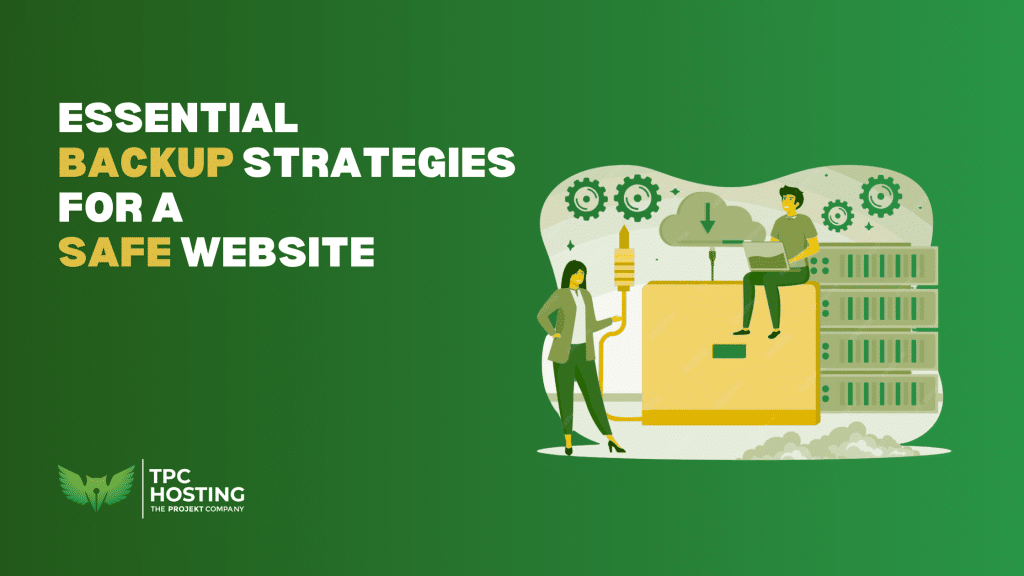
Essential Backup Strategies For a Safe Website
Data is the currency of the digital economy. For any business with an online presence, data loss isn’t just inconvenient—it’s potentially business-ending. A single hour of downtime can cost thousands in lost revenue, damaged trust, and regulatory penalties. Yet, many organizations still rely on outdated or incomplete backup solutions that fail when they’re needed most.
This is where smart backup strategies come into play. Unlike traditional backups that simply copy files, smart strategies combine automation, redundancy, encryption, and recovery workflows designed for the pace of modern business. Hosting providers that integrate these capabilities give businesses the advantage of resilience, continuity, and peace of mind.
Why Backups Matter
Every website stores valuable data: customer details, transactions, content, and configurations. Losing this information can mean more than just downtime—it can lead to lost sales, damaged reputation, and even compliance violations. According to industry studies, nearly 60% of businesses that suffer data loss shut down within six months.
Smart backup strategies not only preserve data but also ensure business continuity. With the right setup, you can restore your website quickly and minimize disruptions.
What Defines a “Smart” Backup Strategy?
Smart backup strategies are built for modern threats and workloads. They go beyond basic file copies and offer resilience across infrastructure layers. Key elements include:
1. Automated Multi-Tier Backups
Manual backups leave too much room for error. Automated solutions that run daily—or even hourly—create consistent protection without effort. Multi-tier systems back up both files and databases across storage layers (on-server, offsite, and cloud).
2. Granular Recovery Options
Smart systems allow restoration of specific files, databases, or configurations. This precision minimizes downtime and prevents overcorrection.
3. Offsite and Geo-Redundant Storage
Keeping all backups in one location is risky. Smart hosting environments replicate backups across multiple data centers, often in different regions, ensuring resilience against localized outages.
4. Incremental and Differential Methods
Instead of duplicating gigabytes of unchanged data, incremental and differential backups capture only what’s new. This makes the process faster, lighter, and more cost-efficient without sacrificing security.
5. Encryption and Compliance
Data in transit and at rest should always be encrypted. For industries dealing with sensitive customer data (finance, healthcare, e-commerce), compliant backup solutions (GDPR, HIPAA, PCI-DSS) are critical.
6. Disaster Recovery Integration
A backup is only as useful as its recovery. Smart strategies embed disaster recovery planning: automated failover, hot standby servers, and tested restoration procedures.
How Hosting Providers Simplify Backup & Recovery
While businesses can try to manage their own backups, professional hosting providers bring significant advantages:
- Integrated Backup Solutions: Automated backups built into hosting plans save time and reduce technical overhead.
- One-Click Restore: Restore entire sites or individual files in minutes from a control panel.
- High-Availability Infrastructure: Redundant servers and secure storage ensure data isn’t dependent on a single point of failure.
- Disaster Recovery Planning: Beyond backups, frameworks guarantee uptime even in critical scenarios.
For example, TPC Hosting provides integrated daily backups, offsite storage, and instant recovery options. By leveraging these features, businesses avoid complex manual setups while gaining enterprise-level protection.
Real-World Scenarios: Backups in Action
- E-Commerce Website Breach: A retailer suffers a malware attack that corrupts product databases. With daily backups, the website is restored within minutes, minimizing lost sales.
- Accidental Content Deletion: A team member deletes critical pages. A backup ensures the website is fully restored without redesign costs.
- Hosting Server Crash: A server failure causes downtime, but offsite backups and redundant systems keep the business online.
Each case highlights the same truth—without backups, recovery would have been far more difficult and damaging.
Best Practices for Website Backup and Recovery
To maximize protection, businesses should follow a few best practices:
- Schedule Regular Backups: Daily or hourly backups depending on website activity.
- Test Restores Frequently: Ensure that backup files are functional and can be restored quickly.
- Secure Backup Data: Use encryption and strong authentication to protect sensitive files.
- Use Multiple Storage Locations: Combine on-server, offsite, and cloud-based backups for redundancy.
- Pair Backups with Security: Firewalls, SSL certificates, and DDoS protection complement a robust backup strategy.
The Business Value of Smart Backup Strategies
Beyond technology, smart backups provide measurable business advantages:
- Minimized Downtime: Every minute of downtime can mean lost revenue and customer frustration.
- Data Integrity: Frequent backups preserve website content, customer data, and transaction histories.
- Customer Confidence: A secure and reliable website builds trust.
- Regulatory Compliance: Many industries require businesses to protect and retain customer data.
- Cost Efficiency: Preventing disasters is far cheaper than fixing the damage afterward.
Future-Ready Backup Solutions
Backup technologies continue to evolve. Forward-looking features include:
- AI-Powered Monitoring: Predictive alerts detect potential failures before they occur.
- Immutable Backups: Data snapshots that cannot be altered by ransomware.
- Self-Healing Systems: Automatic rollback when anomalies are detected.
- Integrated Cloud-Native Solutions: Tight coupling with PaaS, Kubernetes, and containerized workloads enables rapid recovery.
By adopting these innovations, businesses can protect themselves from current and emerging threats.
Final Thoughts
In a digital ecosystem where downtime can devastate a business, smart backup strategies are essential. They ensure that no matter the threat—cyberattacks, hardware failure, or human error—your website can recover quickly and reliably.
Partnering with a hosting provider like TPC Hosting, which integrates automated backups, offsite storage, and disaster recovery into its services, makes protecting your website seamless.
Smart backups aren’t just about storing data—they’re about keeping your business online, maintaining customer trust, and ensuring long-term stability.









